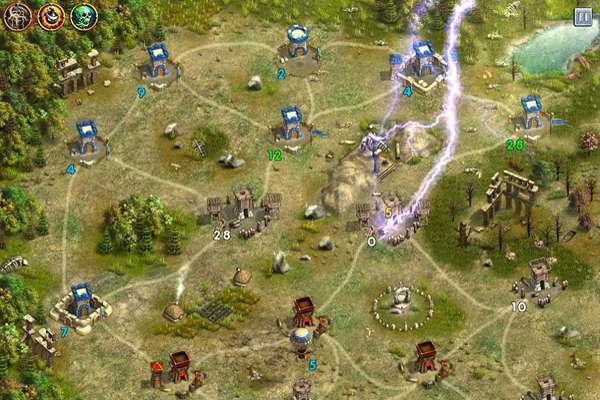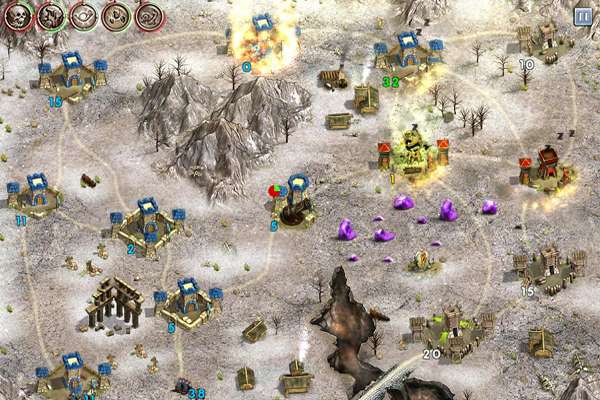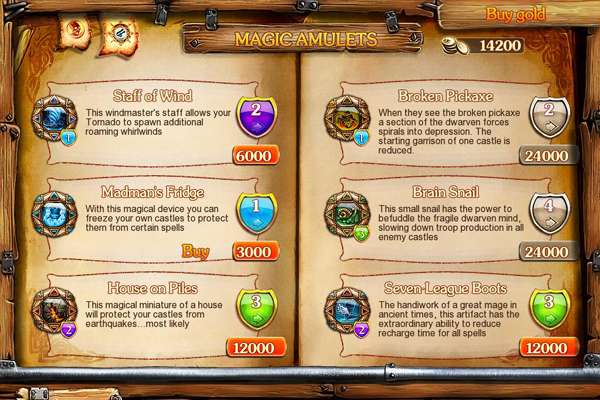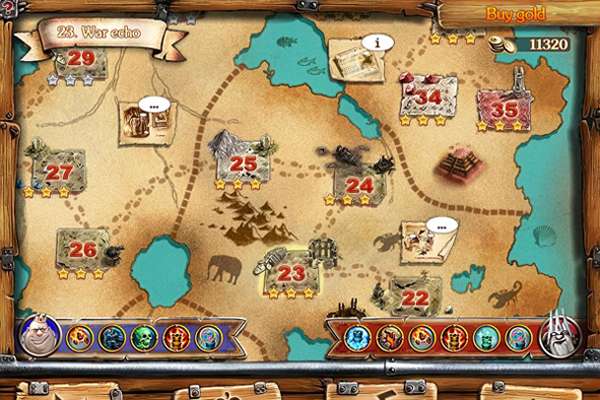
Fantasy Conflict iOS Review
If not for platformers, the tower defense genre would more than likely be the undisputed champ of iOS marketplace. For a game to stand out in such a crowded marketplace, it needs simultaneously to be innovative and entertaining (and more than a little fun). Fantasy Conflict, a new title from Gaijan entertainment, is such a game. While not perfect, it’s fast-paced gameplay and strategic depth promise a tower defense game that’s slightly different and much better than you’ve expected from the genre in a very long time.
The game’s story is basic, but it compliments the action rather well. Told through humorous slides and text snippets, you’re privy to the story of a kingdom named Baldoria where a king has overslept and he’s angry because of it. Seriously. It may not sound like much, but it’s the type of offbeat humor that fits perfectly with the game’s design. However, though the story is certainly appreciated, I can’t say that much was done with it beyond the minor snippets. It’s great to have some continuity between skirmishes, but the game doesn’t allow the story to dictate how any particular element or level operates. Still, you’ll likely be so busy trying to beat the game that you won’t mind the skeleton story (which is a shame, because it’s actually quite funny).

Instead of a traditional tower defense game, Fantasy Conflict tasks you with defending and capturing bases. Simple enough. However, your objective isn’t just to defend your base – you’re also responsible for managing resources within your base and sending out troops to conquer other bases connected to your own. While basic in premise, you’re always playing against an AI that usually outnumbers and is more powerful than you. You’re stationed in one base with a certain number of troops at the beginning of a level, and the objective is to capture all of the enemy’s bases before he captures yours.
In a neat twist, there are neutral towns between you and the enemy, leading to strategic maneuvering during every battle that is sorely lacking in other titles like Fantasy Conflict. On earlier levels, it’s quite easy to just overwhelm a town and withstand the enemy’s attempts to conquer it. However, later levels showcase numerous “spells” and “amulets” that radically influence how a level operates.

For instance, on one level, you might have spells that call in reinforcements, a whirlwind to destroy the enemy’s base, or a fire storm that decimates enemy troop levels. Your enemy also has numerous spells at it’s disposal as well, so deciding when to attack is just as important as where you’re attacking. Factor in other variables like optional upgrades to bases, skirmishes between troops as they move between bases, and aerial warfare that operates completely different from ground warfare makes planning your moves more important than you realize.
Once you’ve passed a small tutorial introducing you to the game’s mechanics, you’re placed on a over-world where you can either play through individual levels of the game’s story mode or play through survival mode. If you’re savvy (or somewhat talented at tower-defense games), you’ll have no problem with the game’s first few stages. However, eventually you’ll find yourself playing survival mode as a necessary supplement to the main story to earn gold to spend on spells and amulets.

Trust me – you’ll need that gold to progress past some levels where the enemy might outnumber you by an obscene amount. There was one particular encounter where I started with 25 troops against 134 enemy troops; after losing over twenty times, I eventually won by grinding in survival mode until I could afford an upgrade to my lightning spell. It wasn’t an ideal solution, but it did let me eventually progress.
By the time you’ve reached the game’s halfway point, learning to manage your resources and plan attacks becomes the only route to success. However, the game oddly doesn’t allow you to pick what spells or upgrades you’d like to take into each battle. Spells and amulets can be bought with gold you earn after each battle, but the upgrades – from what I could tell – don’t always carry over from level to level and are randomized depending upon each battle scenario.

Call me old-fashioned, but I expect to have the option of choosing upgrades if I’ve spent gold for them. This would be a minor complaint, but later levels in the game are dependent upon your skillful usage of particular spells. Forcing me to experiment with spells and amulets (not to mention grinding for gold to buy certain spells) could have increased the game’s replayability, and given me the freedom to try different combinations of spells to increase my score on each level. Instead, I often found myself scrambling in matches where endurance might have won the fight, but I had no choice except to keep trying a speed win. Speed, more often than not, is the only factor that matters in the game, and an option to play the game at various speeds might actually produce more of a lasting appeal.
Still, Fantasy Conflict is well worth the price of admission. The game echoes Game of Thrones with an outlandish ice-king enemy, then blends that vision with a cartoon style that perfectly matches the gameplay. While you may grow frustrated at how quickly the difficulty escalates between stages, the quirkiness of the characters and upgrade system offer an experience that’s quite enjoyable and worth the time you’ll spend playing. Just remember – plan ahead. You’ll thank me later.
